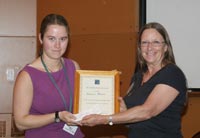Poultry CRC Program Manager, Kevin Whithear, was recently awarded the Medal of the Order of Australia“for service to veterinary science and education, particularly through research, development and production of vaccines to control major diseases in poultry.” Kevin was instrumental in the establishment of the CRC and held the positions of Deputy CEO and Education Coordinator until last year. Author of 60 research papers on veterinary microbiology, Kevin was also president of the Australian Veterinary Poultry Alliance (AVPA), as well as being a key scientist involved in the development and commercialisation of two live mycoplasma vaccines, ts-11 and MS-H.
The Poultry CRC’s new Education Coordinator, Julie Roberts, is also in the limelight, picking up the Australian Poultry Award at the Australian Poultry Science Symposium (APSS) in Sydney last February for her long-term outstanding contribution to poultry science and the Australian poultry industry.
University of New England (UNE) Animal Science Postgraduate, Katrin Renz, also got a gong at APSS, winning the Australian Poultry CRC Award for the best oral presentation by a postgraduate student. During her presentation, Katrin, who is currently working towards a PhD on Marek’s Disease, spoke about her work on reducing feather pecking in layers using environmental enrichment strategies.
Last, but not least, Poultry CRC PhD student, Anthony Keyburn, is on the way to Perth in May for the CRC Association’s annual conference, where he will speak to delegates about his work with necrotic enteritis. Anthony was one of only a handful of successful applicants for the plenary session, Showcasing CRC Early Career Scientists, and will talk about “Overturning 30 years of dogma in poultry disease”. Last year, working in a team led by Poultry CRC Project Leader, Dr. Robert Moore of CSIRO Livestock Industries, Anthony provided the first definitive evidence that alpha-toxin is not an essential virulence factor in the pathogenesis of necrotic enteritis in chickens.



